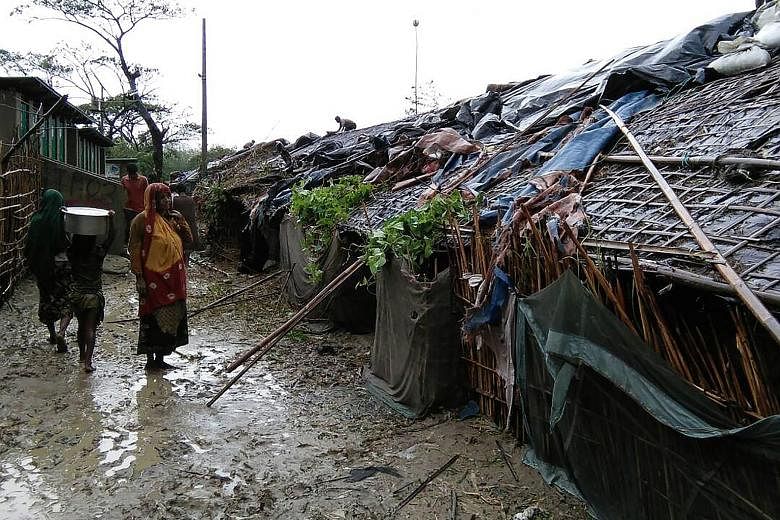COX'S BAZAR (Bangladesh) • Aid workers warned yesterday of an "acute crisis" in Bangladesh after a cyclone destroyed thousands of homes and devastated camps housing Rohingya refugees, leaving many without food or shelter.
Hundreds of thousands of Rohingya live in the overcrowded camps in Cox's Bazar on the southeast coast after fleeing violence in neighbouring Myanmar.
Cyclone Mora battered the area on Tuesday, killing seven people and forcing the evacuation of 600,000 residents. India's navy said it had pulled 33 Bangladeshi survivors and a body from the Bay of Bengal yesterday during search and rescue operations.
Some of the worst damage was at the camps housing the 300,000 Rohingya, whose numbers swelled last year following a military crackdown on the stateless Muslim minority in Myanmar.
"There is an acute crisis of food, shelter, health services, water and sanitation facilities in the makeshift settlements following the storm," said Ms Sanjukta Sahany, local head of the International Organisation for Migration which coordinates relief in some of the camps.
Ms Sahany said the storm had destroyed or damaged at least 16,010 homes in the makeshift camps and seriously damaged clinics run by aid agencies for the Rohingya and the local community.
Aid workers scrambled to get food to the camps, which house around 300,000 Rohingya, many of whom were observing the Ramadan fast when the cyclone struck.
"We are also repairing community structures and schools so that families that are sleeping in the open can move inside until their sheds can be repaired," said Mr John McKissick, who heads the Cox's Bazar office of the United Nations refugee agency, United Nations High Commissioner for Refugees.
Refugees have said they were given no official warning of the storm and were unable to salvage stockpiles of food for the breaking of the fast when it hit.
"No charities came to offer food. Some people shared a small piece of bread between a group of four," said community leader Mohammad Rafique Habib. "Pregnant women, children and the elderly are suffering most."
Mr Abdul Matin, who lives in a camp for unregistered Rohingya refugees, said many had crowded into schools and mosques for the night, while others were forced to sleep in the open.
Mr Haji Abdus Salam - who lives in Nayapara camp with his 13 children, two wives and 10 grandchildren - said the family had not eaten since Tuesday.
Outside the camps, the Bangladeshi authorities say 20,000 homes were destroyed and another 39,000 damaged by the cyclone, which brought winds of up to 135kmh.
AGENCE FRANCE-PRESSE

